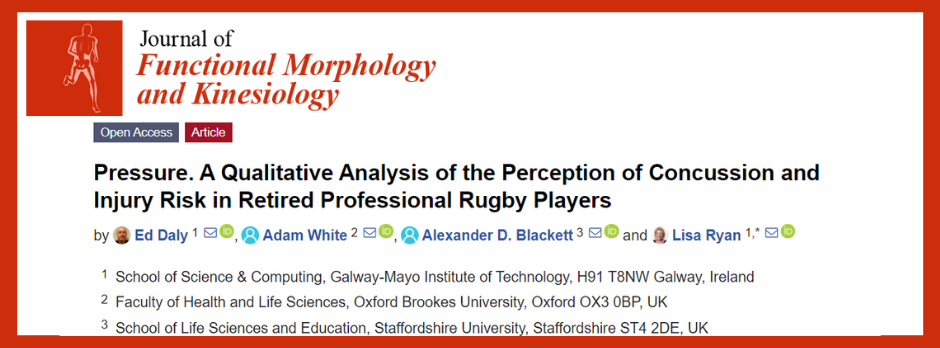by Ed Daly 1,Adam White 2,Alexander D. Blackett 3 and Lisa Ryan 1,*
1School of Science & Computing, Galway-Mayo Institute of Technology, H91 T8NW Galway, Ireland
2Faculty of Health and Life Sciences, Oxford Brookes University, Oxford OX3 0BP, UK
3School of Life Sciences and Education, Staffordshire University, Staffordshire ST4 2DE, UK
*Author to whom correspondence should be addressed.
Academic Editor: Giuseppe MusumeciJ. Funct. Morphol. Kinesiol.2021, 6(3), 78; https://doi.org/10.3390/jfmk6030078
Received: 3 September 2021 / Revised: 13 September 2021 / Accepted: 14 September 2021 / Published: 21 September 2021
Abstract
This study interviewed retired professional rugby union players (≤10 years since retirement) to discuss their careers in the game of rugby union. The primary aim of the study was to document their understanding of concussion knowledge and the analogies they use to describe concussion. In addition, these interviews were used to determine any explicit and implicit pressures of playing professional rugby as described by ex-professional rugby players. Overall, 23 retired professional rugby players were interviewed. The participants had played the game of rugby union (n = 23) at elite professional standard. A semi-structured individual interview design was conducted with participants between June to August 2020. The research team reviewed the transcripts to identify the major themes from the interviews using a reflexive thematic analysis approach. Four major themes were identified: (1) medical and theoretical understanding of concussion, (2) descriptions of concussion and disassociated language, (3) personal concussion experience, and (4) peer influences on concussion within the sport. These were further divided into categories and subcategories. The interviews highlighted that players did not fully understand the ramifications of concussive injury and other injury risk, as it became normalised as part of their sport. This normalisation was supported by trivialising the seriousness of concussions and using dismissive language amongst themselves as players, or with coaching staff. As many of these ex-professional players are currently coaching rugby (48%), these interviews could assist coaches in treating concussion as a significant injury and not downplaying the seriousness of concussion in contact sports. View Full-Text
Keywords: concussion; professional rugby union; long term health; brain injury


